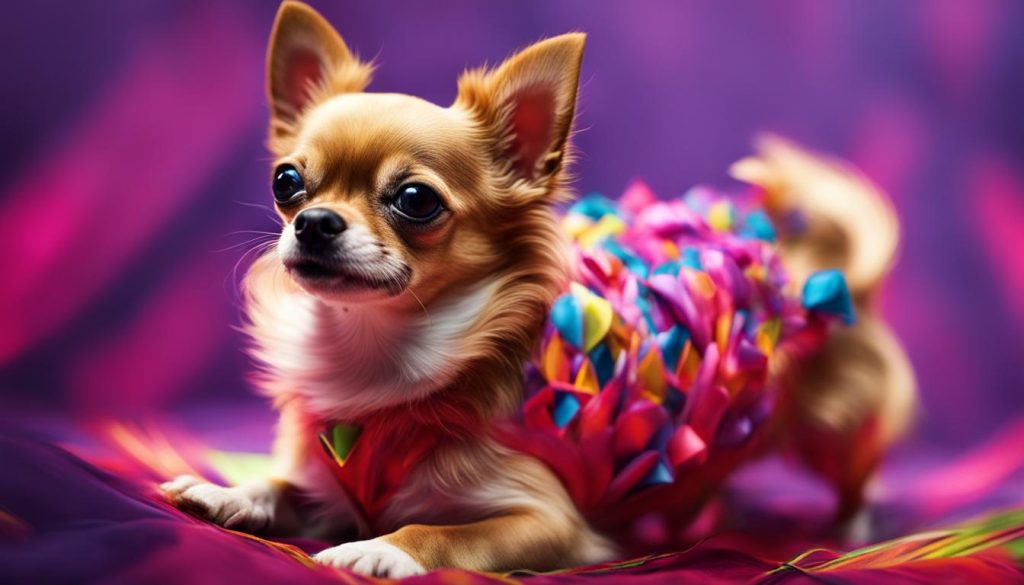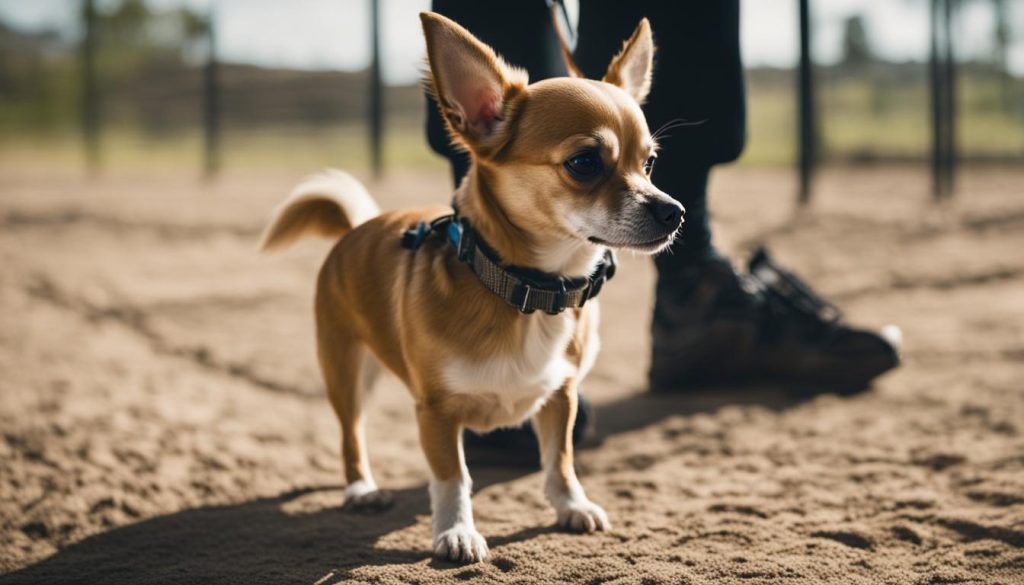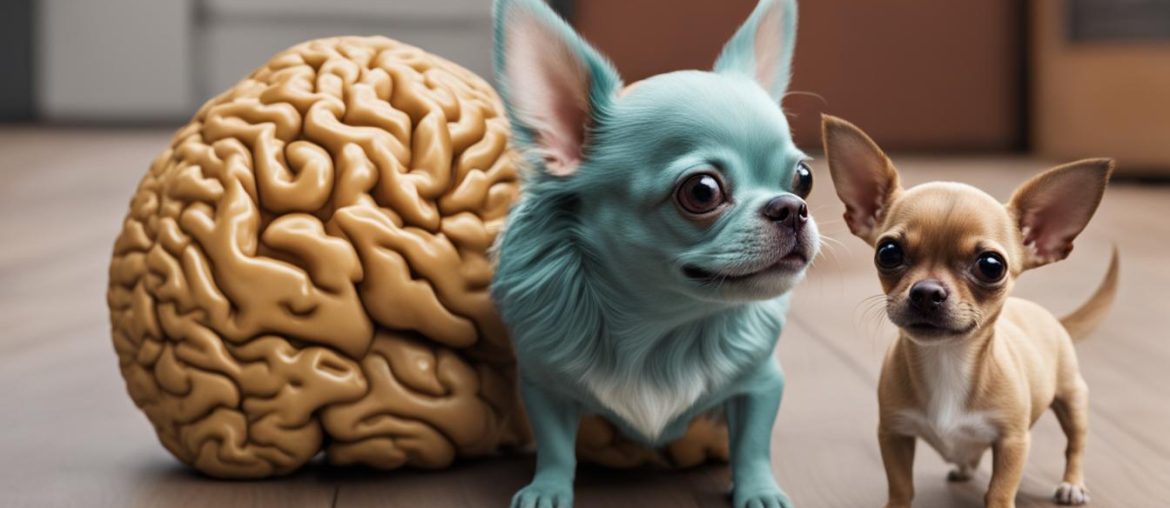When it comes to Chihuahuas, don’t let their small size fool you. These pint-sized pups actually possess brains that are proportionally large compared to their tiny bodies. In fact, Chihuahuas have one of the highest brain-to-body size ratios among all dog breeds. Their intelligence and behavior reflect this unique characteristic, making them fascinating companions to study and understand.
Despite their petite frames, Chihuahuas have brains that weigh an average of 55-56 grams, which is roughly 1.95-2 ounces. This may not seem significant, but considering their overall size, it’s quite impressive. On the scale of brain-to-body size ratio, Chihuahuas have one of the highest ratios among dogs.
Key Takeaways:
- Chihuahuas have brains that are proportionally large compared to their bodies.
- The average weight of a Chihuahua’s brain is around 55-56 grams.
- Chihuahuas have one of the highest brain-to-body size ratios among all dog breeds.
- Despite their small size, Chihuahuas exhibit impressive intelligence and behavior.
The Size of a Chihuahua’s Brain

A Chihuahua’s brain is comparable in size to a tangerine or orange. It weighs around 55 grams, which is considered normal for dogs. In terms of the brain-to-body size ratio, Chihuahuas have a ratio of about 1:125, which is higher compared to other dog breeds. This means that their brains are relatively large compared to their overall body size.
In comparison to their small bodies, Chihuahuas have a surprisingly large brain. The weight of their brain, approximately 55 grams, is similar to the weight of a tangerine or orange. This size is considered normal for dogs. What sets Chihuahuas apart is their impressive brain-to-body size ratio. With a ratio of about 1:125, Chihuahuas have relatively large brains in proportion to their overall body size.
Having a larger brain in relation to their body size may contribute to the intelligence and cognitive abilities exhibited by Chihuahuas. Despite their tiny stature, they possess remarkable memory, quick thinking, and problem-solving skills. This brain-to-body size ratio is one of the highest among all dog breeds, emphasizing the exceptional cognitive capabilities of Chihuahuas.
| Statistic | Chihuahua | Average Dog Breed |
|---|---|---|
| Brain Weight | Approximately 55 grams | Varies by breed |
| Brain-to-Body Size Ratio | About 1:125 | Varies by breed |
The table above highlights the specific details of a Chihuahua’s brain size and its comparison to the average dog breed. Chihuahuas have an average brain weight of approximately 55 grams, whereas the weight can vary among different dog breeds. The brain-to-body size ratio for Chihuahuas is about 1:125, which is significantly higher compared to other breeds whose ratio can differ. This data further emphasizes the exceptional brain size of Chihuahuas and its impact on their cognitive abilities.
Unique Traits of a Chihuahua’s Brain

Chihuahuas have a few unique traits in their brain that contribute to their intelligence and personality. While their brains may not have many folds, they still exhibit impressive cognitive abilities.
One distinctive feature of a Chihuahua’s brain is the presence of distinct bumps on their heads. These bumps can indicate the gender of the Chihuahua, adding an interesting physical characteristic to their already unique appearance. These gender-specific bumps are a special feature found only in Chihuahuas, setting them apart from other dog breeds.
Additionally, Chihuahuas have a larger third ventricle in their brain, compared to other dog breeds. This larger third ventricle allows for increased absorption of oxygen and glucose into the cerebral cortex, enhancing brain function and contributing to their intelligence and smartness.
The combination of these special features in a Chihuahua’s brain contributes to their impressive cognitive abilities, allowing them to navigate and adapt to their environment with agility and quick thinking. Despite their small size, Chihuahuas possess a big personality and brainpower.
Health Problems Related to Brain Size
Chihuahuas, like other small dog breeds, can be more susceptible to certain health issues associated with their brain size. These health problems include hydrocephalus, encephalitis, and senior dog dementia.
Hydrocephalus, commonly known as “water on the brain,” is a condition that occurs when there is an excessive build-up of cerebrospinal fluid in the brain, causing it to swell. Chihuahuas are particularly prone to hydrocephalus due to their small size and delicate skulls. This condition can lead to various symptoms such as a domed skull, behavioral changes, seizures, and even death if left untreated.
Encephalitis, on the other hand, is characterized by inflammation of the brain and can be caused by viral, bacterial, or fungal infections. Chihuahuas may be more susceptible to encephalitis due to their small size and potentially weakened immune systems. Symptoms of encephalitis can vary but may include fever, seizures, neurological abnormalities, and changes in behavior or cognition.
Senior Chihuahuas, like other aging dogs, may also experience cognitive dysfunction syndrome (CDS) or canine cognitive dysfunction (CCD), which is similar to dementia in humans. This condition can manifest as memory loss, confusion, disorientation, changes in sleep patterns, and altered behavior. It’s essential for senior Chihuahua owners to provide proper care and seek veterinary advice to manage and improve their cognitive function.
| Health Problem | Description |
|---|---|
| Hydrocephalus | A build-up of cerebrospinal fluid in the brain, causing swelling. |
| Encephalitis | Inflammation of the brain, often caused by infections. |
| Senior Dog Dementia | Cognitive dysfunction syndrome (CDS) or canine cognitive dysfunction (CCD), similar to dementia in humans. |
Brain Stimulation for Chihuahuas

Chihuahuas require mental stimulation to keep their minds sharp and healthy. Providing them with interactive toys and puzzle toys can challenge their brains and improve their cognitive function. Physical exercise is also important for Chihuahuas, as it increases blood flow to the brain and promotes overall brain health. Short daily walks, playtime, and agility or obedience training are recommended for keeping Chihuahuas physically and mentally active.
Training and Intelligence

When it comes to obedience training, Chihuahuas may not be at the top of the class like some other breeds. However, they possess a high level of adaptive intelligence, allowing them to learn from their surroundings, solve problems, and adapt to new environments.
Chihuahuas respond well to positive reinforcement during training. Patience and consistency are crucial in their learning process. By using rewards and praise, we can encourage them to excel and overcome any training challenges they may face.
One effective approach for training Chihuahuas is to utilize their intelligence and curiosity. Incorporating puzzle toys and interactive games into their training sessions can stimulate their minds and keep them engaged.
Chihuahuas thrive under a positive training environment, where they feel motivated and supported. By focusing on positive reinforcement and adapting training methods to suit their unique intelligence, we can unlock their full potential and build a strong bond with our furry friends.
Chihuahuas as Watchdogs

Chihuahuas are well-known for their excellent watchdog abilities. Their natural alertness and protective instincts make them highly effective in guarding their families and homes. Despite their small size, Chihuahuas possess a fierce protective behavior that should not be underestimated.
One of the most notable characteristics of Chihuahuas as watchdogs is their tendency to bark. Barking serves as both a warning signal to their owners and a deterrent to potential threats. Chihuahuas have a sharp and loud bark, which can alert their owners to any potential danger or intrusion. This distinctive barking behavior is a clear indication that Chihuahuas are on high alert and ready to protect their loved ones.
Chihuahuas’ protective behavior is deeply ingrained in their nature. Even though they may be small, they possess a brave and fearless spirit, always willing to stand up for their family members. Chihuahuas have been known to confront much larger animals or strangers, showing remarkable courage and determination.
To further emphasize the effectiveness of Chihuahuas as watchdogs, it is essential to understand that their small size allows them to easily navigate and access areas that larger dogs cannot. Their size gives them an advantage in staying vigilant and alert in various environments.
Chihuahuas’ protective behavior combined with their natural alertness makes them a reliable and efficient watchdog breed. Their barking serves as an important warning mechanism, signaling potential threats and deterrents. Despite their petite frame, Chihuahuas have the heart and courage of a giant when it comes to protecting their loved ones.
Different Types of Chihuahuas and Their Brain Sizes

Chihuahuas are a popular dog breed known for their small size and distinctive features. They come in different varieties, including short-hair and long-hair Chihuahuas, as well as different head shapes such as apple head and deer head. While these variations contribute to their unique appearances, they do not significantly affect the size of their brains.
The brain size of Chihuahuas remains consistent across the different types, with their intelligence and cognitive abilities relatively similar. Whether you have a short-hair Chihuahua or a long-hair Chihuahua, both can display impressive memory, quick thinking, and problem-solving skills. Similarly, whether your Chihuahua has an apple head or a deer head, their brain size and function remain unchanged.
It’s important to note that the variations in appearance among Chihuahuas are primarily cosmetic. The different types of Chihuahuas share the same basic brain structure, allowing them to exhibit their innate intelligence and adaptability.
Wrapping Up
Chihuahuas, despite their small size, possess brains that are proportionally large, allowing for impressive intelligence, problem-solving skills, and adaptability. Their brain-to-body size ratio is one of the highest among all dog breeds, indicating their cognitive abilities. However, it is crucial to be mindful of potential health concerns associated with their brain size, such as hydrocephalus, encephalitis, and senior dog dementia.
Proper brain stimulation and care play a vital role in ensuring the well-being of Chihuahuas. Engaging them with interactive toys and puzzle toys can challenge their minds, enhancing their cognitive function. Regular physical exercise, including short daily walks and playtime, promotes blood flow to the brain, contributing to overall brain health.
By providing the necessary mental stimulation and following vigilant health practices, Chihuahuas can thrive and lead healthy lives. Their remarkable intelligence and unique personalities make them wonderful companions, but it is crucial to prioritize their brain health to ensure their long-term well-being.
FAQ
How big are Chihuahuas’ brains?
Chihuahuas have brains that are proportionally large compared to their body size. The average weight of a Chihuahua’s brain is around 55-56 grams, which is about 1.95-2 ounces. This makes their brain-to-body size ratio one of the highest among all dog breeds.
What is the size of a Chihuahua’s brain?
A Chihuahua’s brain weighs around 55 grams, which is considered normal for dogs. In terms of the brain-to-body size ratio, Chihuahuas have a ratio of about 1:125, which is higher compared to other dog breeds. This means that their brains are relatively large compared to their overall body size.
What are the unique traits of a Chihuahua’s brain?
Chihuahuas have a few unique traits in their brain that contribute to their intelligence and personality. While their brains may not have many folds, they still exhibit impressive cognitive abilities. Chihuahuas have distinct bumps on their heads, which can indicate their gender. They also have a larger third ventricle, allowing for increased absorption of oxygen and glucose into the cerebral cortex.
What health problems are related to Chihuahuas’ brain size?
Chihuahuas, like other small dog breeds, are more prone to certain health problems related to their brain size. Hydrocephalus, also known as “water on the brain,” can occur in Chihuahuas due to a build-up of cerebrospinal fluid, causing the brain to swell. Encephalitis, inflammation of the brain, can also affect Chihuahuas and can be caused by various factors. Additionally, senior Chihuahuas may develop cognitive dysfunction syndrome (CDS) or canine cognitive dysfunction (CCD), a condition similar to dementia in humans.
How can I stimulate my Chihuahua’s brain?
Chihuahuas require mental stimulation to keep their minds sharp and healthy. Providing them with interactive toys and puzzle toys can challenge their brains and improve their cognitive function. Physical exercise is also important for Chihuahuas, as it increases blood flow to the brain and promotes overall brain health. Short daily walks, playtime, and agility or obedience training are recommended for keeping Chihuahuas physically and mentally active.
Are Chihuahuas intelligent?
Chihuahuas may not excel in obedience training compared to other dog breeds, but they are highly intelligent when it comes to adaptive intelligence. They can learn from their surroundings, solve problems, and adapt to new environments. Patience and positive reinforcement are key when training Chihuahuas, as they respond well to rewards and praise.
Are Chihuahuas good watchdogs?
Chihuahuas have a reputation for being excellent watchdogs due to their natural alertness and protective instincts. They are known for their tendency to bark, which serves as a warning signal to their owners and acts as a deterrent to potential threats. Chihuahuas’ small size should not be underestimated, as they can be fiercely protective of their family members.
Do different types of Chihuahuas have different brain sizes?
Chihuahuas come in different varieties, including short-hair and long-hair Chihuahuas, as well as different head shapes such as apple head and deer head. However, these variations do not significantly affect the size of their brains. The brain size of Chihuahuas remains consistent across the different types, with their intelligence and cognitive abilities relatively similar.
What can be concluded about Chihuahuas’ brain size?
Chihuahuas have brains that are proportionally large compared to their body size. Despite their small brains, they exhibit impressive intelligence, problem-solving skills, and adaptability. However, it’s important to be aware of potential health concerns related to their brain size, such as hydrocephalus, encephalitis, and senior dog dementia. Providing proper brain stimulation and care can help Chihuahuas thrive and lead healthy lives.






